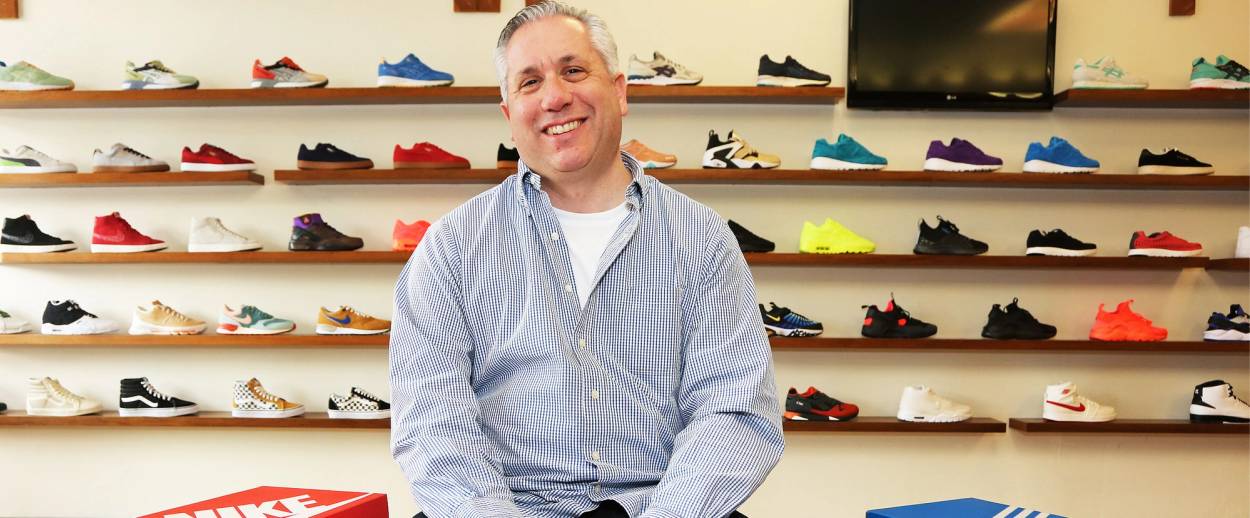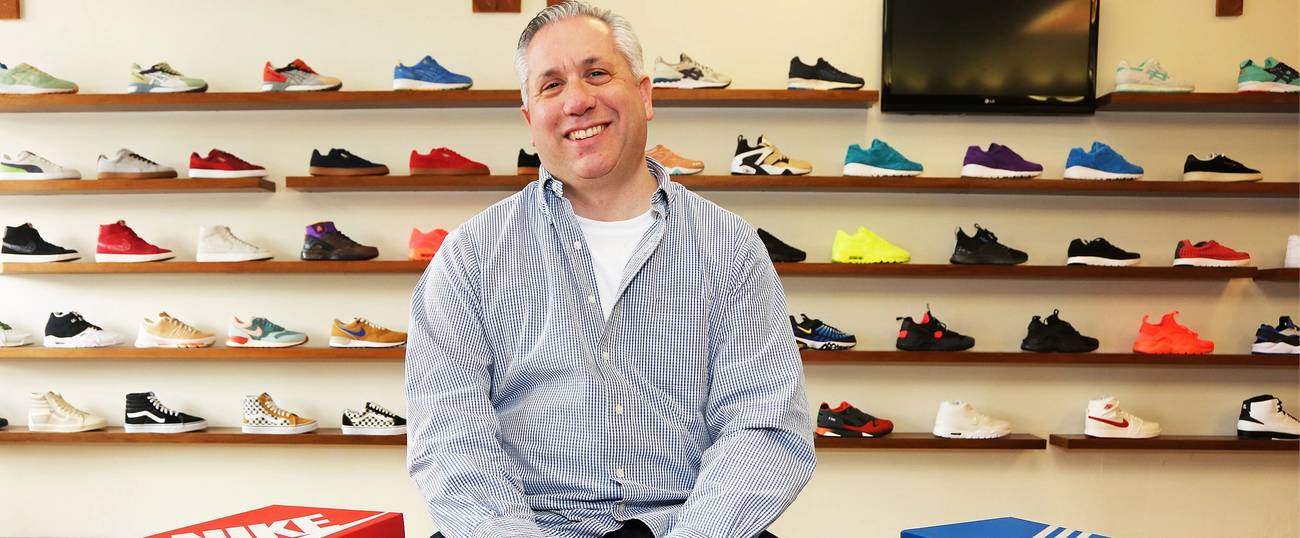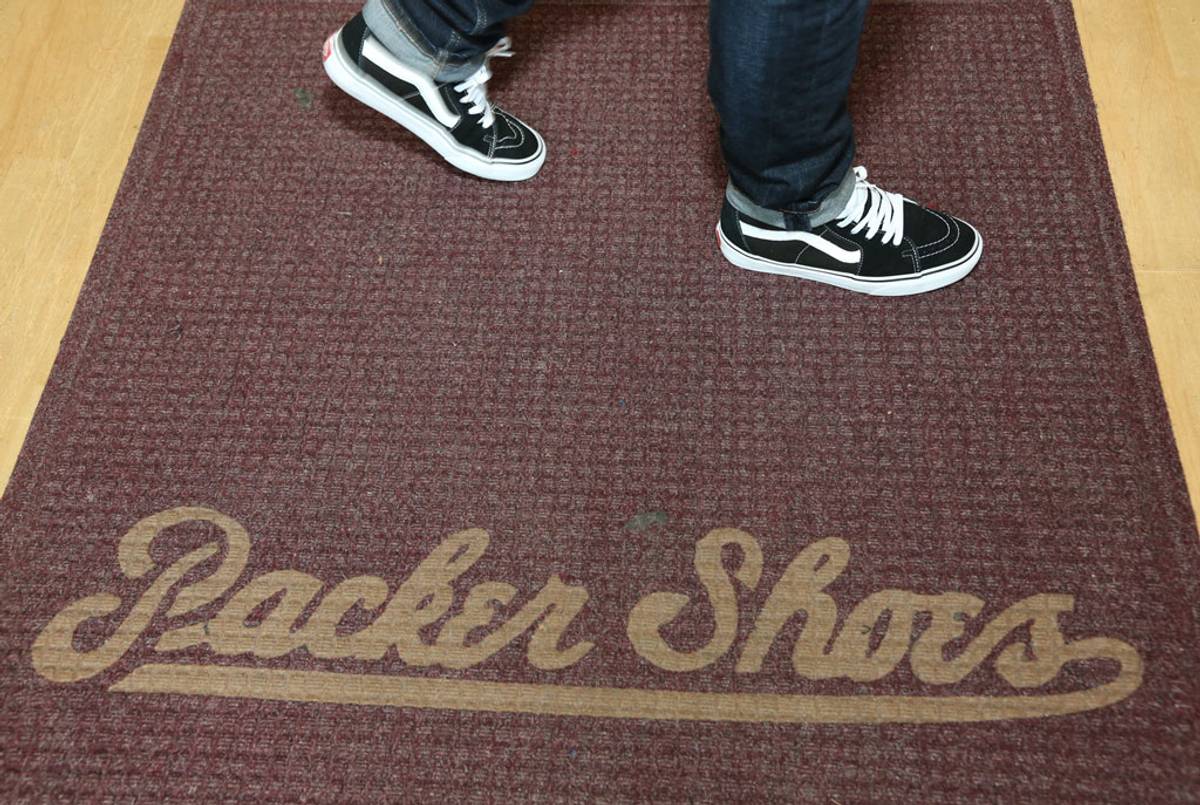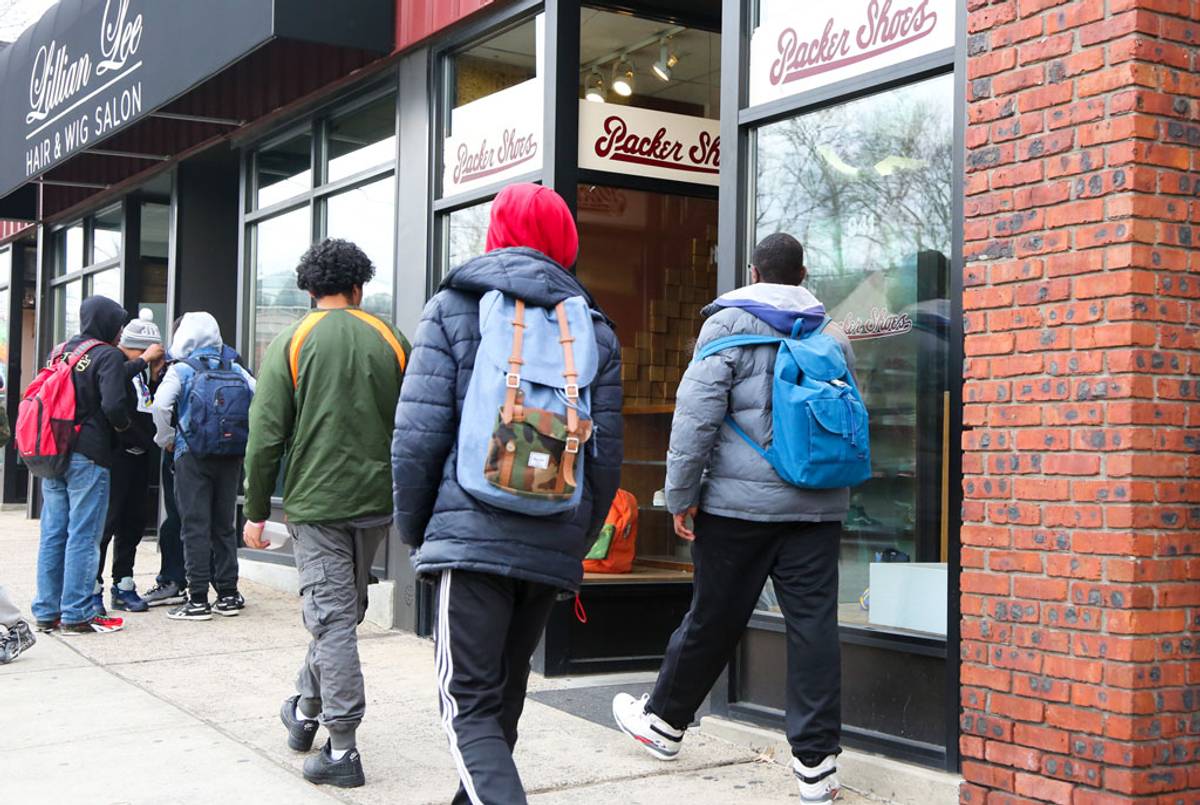Mike Packer, the Jewish Sneaker King of Teaneck, N.J.
As the NBA conference finals kick off, this tastemaker, collaborator, and doyen knows what the fans want on their feet




Mike Packer’s phone wouldn’t stop buzzing. Phone calls and emails, but mostly text messages. On a recent afternoon, he had received about 40 over a 20-minute stretch. It was as if anyone who’d ever shaken his hand was reaching out.
“That kind of week,” he said from behind his glass-top desk, which at that moment was covered in various piles of papers and folders. As if on cue the phone began to ring. Packer leaned forward, glanced down at the number flashing across his iPhone screen, rolled his eyes, and let out a sigh.
“Yeah,” he said as he raised the phone up to his left cheek.
“Mr. Packer, sorry to bother you,” the voice on the other end of the call said. “I’m calling for Ed Lover,” the radio DJ.
Packer cut him off. “That’s OK, but I’m just telling you, if you’re calling about the Yeezys, chief, you’re going to have to enter the raffle in the store. I don’t mean to be a jerk about it …”
“Nah, that’s OK,” the caller said. “I understand.”
Packer, 46, said goodbye and laid the phone flat on the desk. He then leaned back into his black office chair and rubbed his hands through his slicked-back gray hair. He was wearing an untucked button-down shirt with cuffed dark jeans and blue Adidas sneakers. His round face let out a big smile.
“This guy hasn’t called me in five years,” he said. “He claims he’s Ed Lover’s boy. Yeah, OK. If Ed Lover wants a pair so badly he can call me.” He rolled his eyes and sighed. “Yeezy season,” he mumbled. His throat was sore and his nose stuffed. He said he hadn’t stopped talking all week and also hadn’t slept. That night, he was heading downtown to a party Adidas was throwing in honor of a new collaboration they were doing with the rapper Pusha T.
Lots of sneakerheads open sneaker shops, and lots of boutique sneaker shops morph into sneakerhead destinations. Few, however, peddle as much influence as Mike Packer. Few become brands into themselves. “He’s got this real ability to zero in on the right item with the right colors and right marketing and tie in all these amazing ideas and perfect details,” said Jon Epstein, the president of Fila USA, who over the years has worked on a number of high-end sneaker collaborations with Packer. “He knows his customers, what they want, and he really understands the brands, their histories, and what made or makes them great.”
A few minutes later Packer’s phone rang again. “You can come by but I have to be out of the office by, like, 3 in the afternoon,” he said. He then briefly covered the phone’s speaker and turned to a visitor sitting across his desk.
“Have you ever tried explaining Shabbos to a Japanese guy?” he asked.
***

Before rappers were making shoes and selling them for $200 a pop, before athletes were netting shoe deals worth millions of dollars, before sneakers were a fixture of fashion and culture, before Michael Jordan ever laced up a pair of Nikes, and before boutique sneaker stores were ever a thing, Packer Shoes was just another neighborhood shoe shop. Originally named Packer Bros., it opened in 1907, and Mike Packer’s grandfather and great-uncle were the founders. Located on Ashburton Avenue in the Northwest section of Yonkers, the store was the quintessential mom-and-pop shop, with glass display windows and an arched entryway hanging over a black-and-white tiled foyer. Inside, towers of shoe boxes lined the walls. The brothers took pride in having something for everyone. Work boots for men. Sneakers for kids. High heels for women. The store serviced all of Yonkers for the next 100 years.
After the Depression Mike’s grandfather took over. He died young, though, and soon after, Mike’s father, Marty, was put in charge. Quickly the store morphed into a second home for his family. Mike grew up in an Orthodox Jewish home in Hartsdale—a small hamlet in Westchester County about 20 miles north of Manhattan—but he and his siblings would hang out in Yonkers after school and on weekends. His mother would stop by and bring his father lunch. “There was a lot of family members around, so a lot of yelling and screaming at each other,” Mike said. “But the entire neighborhood just loved the place.”
Marty’s knack for the business—and, perhaps more to the point, his understanding of his customers’ interests—transformed the shop into a Yonkers landmark. He was one of the first shoe salesmen in the area to realize that construction workers weren’t the only ones interested in Timberland boots. He had accounts with companies like Nike and Adidas before everyone else. He’d keep a log in the back of his top customers and their favorite shoes and give them a call anytime he got something new in stock. Yonkers was, and remains, a tough city. But its resident took care of Packer because he took care of them.
“That part of Yonkers, it wasn’t the nicest, but it was still the best education I could ever have gotten,” Mike said. “I got to go to business school every day, and the key was that I got to deal with people, real people, on a daily basis.”
When I met with him, he was also quick to point out that he believes that interacting with the community around him as fellow human beings is one of the traits that separates him from many of the Orthodox Jews he grew up with. “People are people,” he said. “That’s it, that’s how I look at it. They all deserve respect. And you know what? The drug dealers who used to come into my father’s store sometimes, they were nicer and smarter than half the people you meet” at temple.
Over the years Mike picked up everything he could from his father and the business. He made his first sale at the age of 7. Later on he learned how important the first and the 15th of every month were. He’d lug bags of sneakers with him to high school—Yeshiva University’s Marsha Stern Talmudic Academy in Washington Heights—every day and sell shoes to his classmates. He loved everything about the business: the energy of the shop, getting to know the different people from all types of different backgrounds, the constant moving of product. But after graduating from Yeshiva University he decided to go to law school. Afterward he gave the world of corporate law a shot. He then served as assistant district attorney in Brooklyn for four years.
Yet he could never fully shake the gravitational pull that sneakers had on him. Once he got yelled at a by a judge in criminal court for asking the defendant about the pair of Nike Air Max 95s on his feet. During trips to the local precinct he’d often spend 20 minutes talking sneakers with perps.
Eventually Packer gave up law and got a job with the telecommunications giant IDT. Part of the gig included repeated trips to Hong Kong, where he’d walk down the bustling streets and see strips of sneaker stores selling the shoes he grew up with, but for triple the price.
At the time Packer was living with his wife and kids—he had two then, now he has three—in Teaneck. He noticed how his son’s rec-league teammates and their families reacted when his son would show up for games donning a pair of Air Jordan 11s. He saw how well some of the new boutiques in the Village were doing. He liked how Teaneck had more than 3,000 students enrolled in its public schools and how diverse it was. Some residents were rich, some were middle class. There were white people and black people and Hispanics and Asians, not to mention the myriad celebrities who called Bergen County home.
“I told my wife, ‘I know it sounds crazy, but I think that shoe store model could be replicated here,’ ” he recalled. “But she, understandably, was a little skeptical at first.” To prove her wrong Packer commissioned a study, the only one he ever did. “We were walking down the street,” he said, “and there were a bunch of kids in front of us. So I said to my wife, ‘Watch this.’ And I asked them if they think Nike Foamposits would sell around here.” Their eyes, according to Packer, all lit up. “I just knew all these kids wanted this stuff,” he said. “I knew they were all going downtown, and that they all had the means and ability to support a store like this.” A month later, Packer Shoes had a new branch on Teaneck Road, a half-mile south of Thomas Jefferson Middle School.
***
The flagship store, about the size of a high-school classroom, is located in the middle of a nondescript suburban strip of small businesses. (Packer opened a second store in Jersey City.) Across the street there’s a sushi restaurant and the brick headquarters of Teaneck Board of Education. Inside, one wall is lined with sneakers, ranging from $60 Pumas to $200 Nikes. The floors are a sand-colored wood. In the middle of the shop sits a bench with a slab of Plexiglas in lieu of a cushion and what seems like 20 pairs of sneakers packed inside.
Design-wise not much has changed since the store opened 13 years ago. At the time Mike was able to leverage his dad’s contacts into a rich, vintage-heavy inventory. He also got a boost from a friend named Adam Leaventown, a lawyer who was a moderator at NikeTalk, one of the first and largest online sneaker forums. Leaventown made the trip out to Teaneck prior to the store’s opening to try to help his friend out. He took some pictures, along with some notes, and then went home and shared the details on his site.

“At the time vintage stuff was going on eBay for like $200 a pop—you just couldn’t find that stuff anywhere,” Packer said. “But we had it. And so we had people coming in from up and down I-95, not to buy stuff to flip but because they really just loved the shoes. People used to say ‘That stuff’s for SoHo, not Teaneck,’ but they just kept coming.”
In fact, Teaneck was just a 15-minute drive from Manhattan. And the Bergen County athletes and celebrities—Fabulous, Jadakiss, whom he knew from Yonkers, Eddy Curry—started showing up. The area also had a rich basketball, and by proxy, sneaker history.
Most of his regulars come in around once a week. They look around for a bit, ask for prices and then return with their parents a few weeks later.
One Monday morning around five years after opening his Teaneck store, Packer received a call from Matt Ting. Then a senior product line manager for Reebok, Ting told Packer that Reebok was planning on releasing some new iterations of the Pumps—in honor of the shoe line’s 20th anniversary—and that he wanted Packer to be involved. Packer was just one of 20 people from around the world tabbed to help out on the project. He had never done collaborations before but Ting told him he liked his ideas. More important, he found them unique.
Ting’s inkling turned out to be right. Packer recalled that Dominique Wilkins—NBA Hall of Famer, “The Human Highlight Reel,” and a Reebok athlete—had never actually been given a personalized shoe. This, Packer thought, was the perfect opportunity to right that oversight. “That shit still goes for $700 on eBay,” Packer said of his Pump20 collaboration, with a smile. “And that opportunity opened so many doors for me.” The Wilkins sneaker showed what Packer could bring to the table: an encyclopedia’s worth of sneaker knowledge coupled with an instinct for which ’90s basketball players can still sell shoes today.
Since being given that shot by Reebok, Packer has morphed into one of most successful collaborators in business. He’s worked with every brand, from giants like Adidas to smaller companies like ASICS. He’s transformed his Teaneck store into a bastion for ’90s basketball and has had Knicks legends like Patrick Ewing and Larry Johnson pass through. During the NBA’s All-Star Weekend last year in New York he was handed the reins to Reebok’s midtown popup store. “He’s able to reach the guys at the top of the pyramid, the beacon consumers,” said Leaventown, who later went on to Puma. “Those are the guys who kids look up to and they follow Packer.”
***
At around 3:30 p.m. some customers started trickling in to the Teaneck store. First came a group of middle-schoolers. One said he owns at least 50 pairs of sneakers. Another said he owns around 60. “But here they have all the classics,” he said. “That’s why I’m always stopping by.”
About 20 minutes later an older kid walked in with a group of seven trailing behind him. He was tall, lanky, and was wearing a white baseball hat. “I got that one box for you sitting right there,” one of the salesmen said, pointing to a stand near the window. The kid retrieved the box and brought it over to the bench in the middle of the store. He then unpacked the shoes—a black-and-white pair of Ewings, a company that Packer played a major role in re-launching—tried them on, and strolled over to the mirror. His family watched as he shifted from side to side and gently tugged at his green pants to see how the sneakers looked. He turned to his mother and smiled.
“It’s his Christmas present,” she said. “I’ve been asking him for three weeks what he wants. He finally told me.”
Yaron Weitzman is regular contributor to Bleacher Report and senior writer for SLAM magazine. His work has also appeared in The New Yorker, New York, and The Ringer. His Twitter feed is @YaronWeitzman.